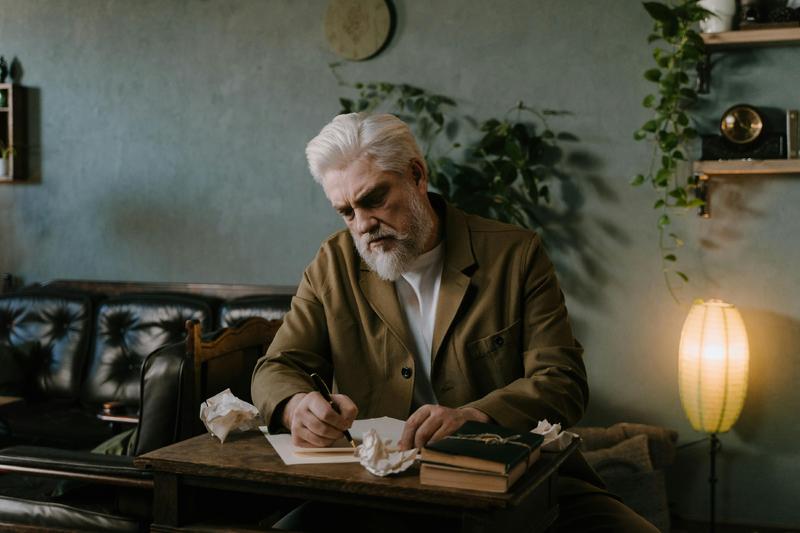Legacy Isn’t What You Think It Is

Most people think of legacy as something far off. Something that only matters when we’re gone. But here’s the thing—legacy isn’t someday. Legacy is now. Because every reaction isn’t just a moment— It’s training your nervous system. And that training is what gets passed on.
This is an important one. Because once you see legacy for what it really is—it reshapes how you live, how you relate, and what you pass on.
Legacy as State, Not Story
We’ve been taught to believe legacy is about reputation. About being remembered for something impressive. But ask yourself— When you think about someone you loved who’s no longer here, what do you actually remember?
It’s not their résumé. It’s not their titles. You remember the way they made you feel. The calm they carried when life was chaotic. Or the tension they couldn’t hide, even in silence. You remember the patience in their voice. The way they looked at you when you needed reassurance. The small amounts of laughter that felt safe and alive.
That’s what sticks. Because that’s what imprints on your nervous system. Legacy isn’t about proving yourself or stacking achievements. It’s about the state you reinforce and pass on—moment by moment.
The Myth of Preservation
A lot of people think legacy means keeping things exactly the way they’ve always been. Repeating old routines. Following rules without question. Holding on tightly to “the way it was.”
But here’s the truth—legacy isn’t something you defend. If it needs defending, it’s already gone.
Think about family traditions. Some of them are worth keeping. A Sunday dinner that brings people together. Others fade. Not because people don’t care, but because they no longer serve connection or life. The tradition itself isn’t the legacy. The state it creates is. Joy. Connection. Respect. Warmth.
A legacy that only repeats the past isn’t alive. A legacy that trains compassion, clarity, or patience—no one can take that away. It doesn’t need defending.

The Everyday Imprint
Here’s the thing—legacy is built less on the big moments and more on the everyday imprint. Why do we remember grandparents with so much love? Not usually because of what they accomplished. It’s the way they laughed at the smallest things. The way they slowed down enough to sit with us. The quiet steadiness they carried into a room.
And why do we sometimes carry tension from people long after they’re gone? Because of the sharpness in their tone. The constant criticism. The worry that leaked into every interaction. That’s the nervous system imprint. That’s the legacy. Every look. Every tone. Every reaction— Each one is training your nervous system and shaping someone else’s.
For example:
- A parent who trains impatience: the child grows up remembering the sighs, the rush, the sharp tone.
- A parent who trains patience: the child remembers being listened to, guided calmly, allowed to stumble without shame.
Legacy isn’t out there, in some future memory. It’s here. In the imprint you’re leaving right now.
The Trap of Achievement
Another trap is chasing legacy through achievement. Through titles. Recognition. Accomplishments. But here’s the thing—you don’t have to prove yourself to have a legacy. You already have one.
Look at parents. Most kids don’t remember their mom or dad’s job title. They remember whether home felt safe—or stressful.
Look at leaders. Years later, people rarely recall the exact strategies or numbers. They remember whether that leader trained them to feel capable—or small.
- Take a boss who trains stress: the team remembers the tension in every meeting. The feeling of walking on eggshells.
- A boss who trains respect: the team remembers feeling capable and valued. That’s the legacy.
And look at friendships. You don’t remember the “achievements” of a best friend. You remember whether they showed up when you needed them. Whether they made you laugh in the middle of a hard day.
Legacy isn’t what you achieve. It’s the state you carried while achieving it. And here’s the relief—you don’t need to defend it, either. Because the nervous systems around you already felt it.

Legacy vs. Achievements
A lot of people chase legacy by building resumes, collecting titles, or stacking accomplishments. And achievements can matter. They can open doors. They can create opportunity. But here’s the thing—your achievements are not your legacy. Because long after the title is gone, what people actually carry is the state you trained while pursuing it.
If you built a career on stress, urgency, and pressure— that stress is what imprints on the people around you. If you built it on patience, clarity, and respect— that’s what endures. Achievements fade. States imprint. That’s the difference.
And it’s not just achievements. Some people try to secure their legacy by writing memoirs or leaving behind stories. And stories can matter. They can inspire, they can capture history. But words on a page don’t override the nervous system imprint you leave behind.
Because when people read those stories—even generations later—what comes through isn’t just the events. It’s the state that shaped those words. If the writing is fueled by resentment or self-importance, that’s the resonance that carries. If it’s written from compassion, clarity, or enthusiasm, that’s the imprint that lives on. A memoir can record what you did. But your legacy is how you were while you did it.

Legacy as Training, Not Accident
This is the part most people miss. You don’t stumble into a legacy. You train it. Every time you redirect frustration into patience—you’re training your legacy. Every time you replace dismissal with respect—you’re training your legacy. Every time you choose compassion over indifference—you’re training your legacy.
And here’s the key— Even a small reaction, repeated with enough emotional intensity, becomes trained in your nervous system. That’s how patterns form. That’s how they get passed on.
For example:
- A friend who trains indifference: people remember the half-present conversations, the constant “too busy.”
- A friend who trains enthusiasm: people remember the warmth, the excitement, the way they celebrated small wins.
Your nervous system doesn’t care about what you intend. It only cares about what you repeat. So the real question isn’t: “What do I want my legacy to be?” The real question is: “What emotional state am I unconsciously training right now?” Because whatever you’re training—that is the legacy you’re leaving.

Legacy Without Proving or Defending
Legacy becomes heavy when we think it’s something we have to earn. Something we have to protect. But here’s the truth—you don’t need to prove it. And you don’t need to defend it.
Think about someone you remember with warmth. They didn’t need to announce their legacy. They didn’t argue for it. You simply felt it in the way they lived. And that’s why it carried forward.
For example:
- The cashier who trains dismissal: you remember feeling unseen, brushed off.
- The cashier who trains kindness: you remember the smile, the genuine “how’s your day going?”
When you train states like patience, respect, or certainty—your legacy speaks for itself. No proof required. No defense necessary.
A Living Legacy
Let’s make this practical. Think about the last time someone gave you their full attention. Really listened. Didn’t rush, didn’t half-check their phone—just listened. That moment sticks. Not because it was dramatic, but because presence itself leaves a mark.
Now think of the opposite. Someone who made you feel invisible, or dismissed. That sticks too. Legacy is alive in these small choices. It’s not someday. It’s the state you’re practicing in this moment.
For example:
- Someone who trained bitterness: their family remembers the complaints, the heaviness, the resentment.
- Someone who trained gratitude: their family remembers the appreciation, the stories, the laughter even in difficulty.
And here’s the freedom in it—you don’t need to protect the past. You don’t need to prove yourself. You don’t need to defend your name. Your legacy is already being written in the nervous systems around you—by how you choose to show up right now.
Self-Legacy
And here’s something people don’t think about— Legacy isn’t just what others remember. It’s also what you remember about yourself. When you look back on your own life— Are you going to remember years of stress, doubt, and reactivity? Or years where you chose patience, clarity, and compassion even when it wasn’t easy?
That’s self-legacy. It’s the story you carry in your own nervous system. And it’s every bit as real as the imprint you leave on others.

The Question That Defines Legacy
So let’s bring it home. The question isn’t: “What will people remember about me?” The question is: “What emotional state am I training—over and over—whether I realize it or not?”
Patience or frustration. Compassion or indifference. Respect or dismissal. Certainty or doubt. That’s the real legacy. Not a future story. Not a reputation you need to prove or defend. But the state you embody, again and again, right now. Legacy isn’t someday. Legacy is now. And legacy is alignment. It’s whether the states you’re training are aligned with the person you’re committed to becoming.
An Invitation
So here’s my invitation to you: When people remember you—will they recall stress, pressure, and impatience? Or will they carry calm, compassion, and respect—because that’s what you trained in yourself, and passed on to them?
If you’re ready to stop managing symptoms and start training a steady, resilient inner state—I’ve built a system for that. It integrates perception, emotion, and nervous system—so you don’t just understand your patterns…you actually shift them.
I also share practices weekly on Instagram—@mikewangcoaching. And if you want more depth, you can join the newsletter here.
